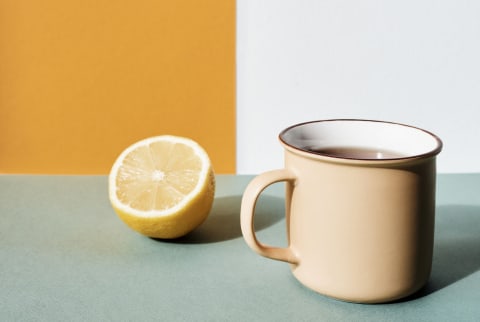Advertisement
5 Ways To Add Bonus Nutrients To Your Herbal Tea, From A Health Coach


As much as I love my daily cup (or three) of coffee, tea has always been the soul-soothing brew I reach for when I need some bonus well-being support. Beyond its delicious flavor and warmth, different types of tea—green, purple, rooibos, herbal, white, black, pu-erh, mate, oolong—may help promote brain function1, cardiovascular health2, and radiant skin, to name a few perks.
Turning for tea can be a fabulous way to support your healthy lifestyle, give your body a nutritious boost, and feel your best all day long. While a simple cup of tea packs so many potential health benefits, as a health coach, I've also discovered some clever ways to add an extra nutrient zing to my favorite brews:
Sweeten wisely.
Kicking the habit of excessive sugar consumption may help keep chronic disease3 at bay. So if you find yourself craving a little sweetness in your tea, there are plenty of natural sugar alternatives that won't drastically affect your glucose levels—and can even add a dose of nutrients. A small amount of antioxidant-laden lucuma powder, stevia (ideally, organic), or a drizzle of honey might be healthier options to keep your sweet tooth satisfied.
Add citrus.
A squeeze of vitamin-C-rich citrus is a fantastic way to level-up your herbal concoction. Lemon, grapefruit, kinnow, mandarin, yuzu, orange, sweet lime, pomelo, kumquat, Buddha's hands, tangerine—the choices are endless when it comes to adding a beneficial, immune-supporting tang to your tea.
Spice it up.
Try maximizing the healing properties of your next brew with some anti-inflammatory, health-friendly gusto. Turmeric, cinnamon sticks, black peppercorns, grated ginger, thyme, or fresh mint leaves are some of my go-to additions to support immunity and help rev up digestion.
Grab a pod.
Adding vanilla pods to your herbal cup might sound indulgent, but the rich, perfumed flavor is worth the splurge. I like vanilla's exotic aroma because of its enlivening yet calming effect on my senses. A little goes a long way: For an individual brew, add the seeds from half a vanilla pod to your pot of water and simmer on low heat for 10 to 15 minutes. For my favorite combination, add this sensuous ingredient to a high-quality black tea and a splash of nondairy milk.
Keep the peels.
Whether it's pineapple, apple, or citrus, fruit peels can give your cup of tea a healthy push—and minimize waste in the process. In particular, orange peels are chock-full of antioxidants4, polyphenols5, and other bioactive compounds, touted for their anti-inflammatory6 properties. To try it out, throw a thin slice of fruit peel (ideally organic) into boiling water for 10 to 12 minutes, along with any herbs or spices of your choice. Cover and simmer for 18 to 20 minutes, remove from the stove, and discard the peels as needed.
Whenever you're ready to put the kettle on, consider these options to add a healthy zest to your brew.
6 Sources
- https://pubmed.ncbi.nlm.nih.gov/28899506/
- https://pubmed.ncbi.nlm.nih.gov/30585192/
- https://www.ncbi.nlm.nih.gov/pmc/articles/PMC4856550/
- https://www.ncbi.nlm.nih.gov/pmc/articles/PMC4287321/
- https://www.sciencedirect.com/science/article/pii/S1658077X16300960
- https://www.sciencedirect.com/science/article/pii/S2213453014000056

Why Nutrition Is Key To Changing Your Relationship With Alcohol
Brooke Scheller, DCN, CNS

Why Alcohol Sabotages Your Gut Health & How To Get Back On Track
Brooke Scheller, DCN, CNS

Why Nutrition Is Key To Changing Your Relationship With Alcohol
Brooke Scheller, DCN, CNS

Why Alcohol Sabotages Your Gut Health & How To Get Back On Track
Brooke Scheller, DCN, CNS

Why Nutrition Is Key To Changing Your Relationship With Alcohol
Brooke Scheller, DCN, CNS

Why Alcohol Sabotages Your Gut Health & How To Get Back On Track
Brooke Scheller, DCN, CNS

Why Nutrition Is Key To Changing Your Relationship With Alcohol
Brooke Scheller, DCN, CNS

Why Alcohol Sabotages Your Gut Health & How To Get Back On Track
Brooke Scheller, DCN, CNS














